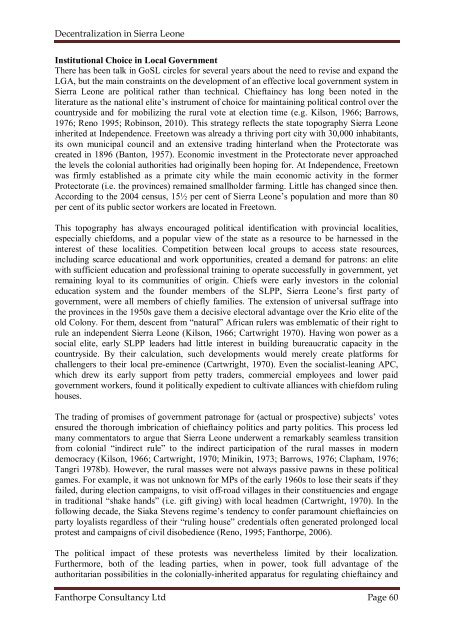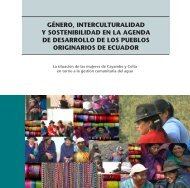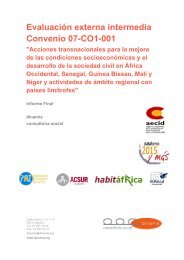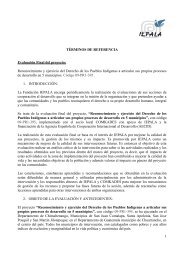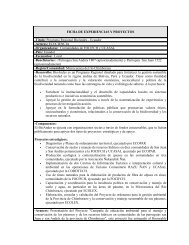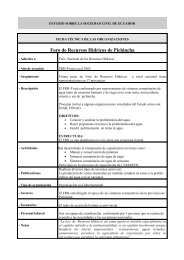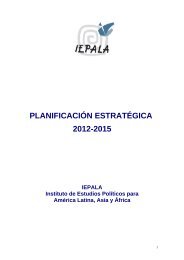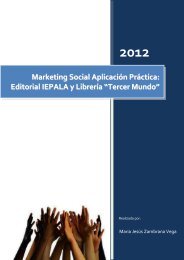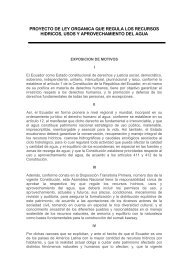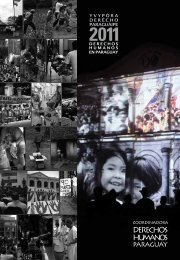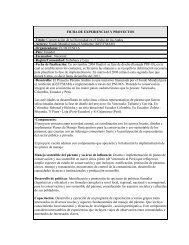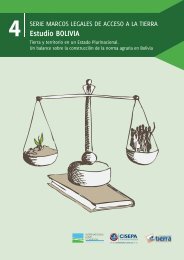Decentralization in Sierra Leone - Research for Development
Decentralization in Sierra Leone - Research for Development
Decentralization in Sierra Leone - Research for Development
Create successful ePaper yourself
Turn your PDF publications into a flip-book with our unique Google optimized e-Paper software.
<strong>Decentralization</strong> <strong>in</strong> <strong>Sierra</strong> <strong>Leone</strong>Institutional Choice <strong>in</strong> Local GovernmentThere has been talk <strong>in</strong> GoSL circles <strong>for</strong> several years about the need to revise and expand theLGA, but the ma<strong>in</strong> constra<strong>in</strong>ts on the development of an effective local government system <strong>in</strong><strong>Sierra</strong> <strong>Leone</strong> are political rather than technical. Chiefta<strong>in</strong>cy has long been noted <strong>in</strong> theliterature as the national elite’s <strong>in</strong>strument of choice <strong>for</strong> ma<strong>in</strong>ta<strong>in</strong><strong>in</strong>g political control over thecountryside and <strong>for</strong> mobiliz<strong>in</strong>g the rural vote at election time (e.g. Kilson, 1966; Barrows,1976; Reno 1995; Rob<strong>in</strong>son, 2010). This strategy reflects the state topography <strong>Sierra</strong> <strong>Leone</strong><strong>in</strong>herited at Independence. Freetown was already a thriv<strong>in</strong>g port city with 30,000 <strong>in</strong>habitants,its own municipal council and an extensive trad<strong>in</strong>g h<strong>in</strong>terland when the Protectorate wascreated <strong>in</strong> 1896 (Banton, 1957). Economic <strong>in</strong>vestment <strong>in</strong> the Protectorate never approachedthe levels the colonial authorities had orig<strong>in</strong>ally been hop<strong>in</strong>g <strong>for</strong>. At Independence, Freetownwas firmly established as a primate city while the ma<strong>in</strong> economic activity <strong>in</strong> the <strong>for</strong>merProtectorate (i.e. the prov<strong>in</strong>ces) rema<strong>in</strong>ed smallholder farm<strong>in</strong>g. Little has changed s<strong>in</strong>ce then.Accord<strong>in</strong>g to the 2004 census, 15½ per cent of <strong>Sierra</strong> <strong>Leone</strong>’s population and more than 80per cent of its public sector workers are located <strong>in</strong> Freetown.This topography has always encouraged political identification with prov<strong>in</strong>cial localities,especially chiefdoms, and a popular view of the state as a resource to be harnessed <strong>in</strong> the<strong>in</strong>terest of these localities. Competition between local groups to access state resources,<strong>in</strong>clud<strong>in</strong>g scarce educational and work opportunities, created a demand <strong>for</strong> patrons: an elitewith sufficient education and professional tra<strong>in</strong><strong>in</strong>g to operate successfully <strong>in</strong> government, yetrema<strong>in</strong><strong>in</strong>g loyal to its communities of orig<strong>in</strong>. Chiefs were early <strong>in</strong>vestors <strong>in</strong> the colonialeducation system and the founder members of the SLPP, <strong>Sierra</strong> <strong>Leone</strong>’s first party ofgovernment, were all members of chiefly families. The extension of universal suffrage <strong>in</strong>tothe prov<strong>in</strong>ces <strong>in</strong> the 1950s gave them a decisive electoral advantage over the Krio elite of theold Colony. For them, descent from “natural” African rulers was emblematic of their right torule an <strong>in</strong>dependent <strong>Sierra</strong> <strong>Leone</strong> (Kilson, 1966; Cartwright 1970). Hav<strong>in</strong>g won power as asocial elite, early SLPP leaders had little <strong>in</strong>terest <strong>in</strong> build<strong>in</strong>g bureaucratic capacity <strong>in</strong> thecountryside. By their calculation, such developments would merely create plat<strong>for</strong>ms <strong>for</strong>challengers to their local pre-em<strong>in</strong>ence (Cartwright, 1970). Even the socialist-lean<strong>in</strong>g APC,which drew its early support from petty traders, commercial employees and lower paidgovernment workers, found it politically expedient to cultivate alliances with chiefdom rul<strong>in</strong>ghouses.The trad<strong>in</strong>g of promises of government patronage <strong>for</strong> (actual or prospective) subjects’ votesensured the thorough imbrication of chiefta<strong>in</strong>cy politics and party politics. This process ledmany commentators to argue that <strong>Sierra</strong> <strong>Leone</strong> underwent a remarkably seamless transitionfrom colonial “<strong>in</strong>direct rule” to the <strong>in</strong>direct participation of the rural masses <strong>in</strong> moderndemocracy (Kilson, 1966; Cartwright, 1970; M<strong>in</strong>ik<strong>in</strong>, 1973; Barrows, 1976; Clapham, 1976;Tangri 1978b). However, the rural masses were not always passive pawns <strong>in</strong> these politicalgames. For example, it was not unknown <strong>for</strong> MPs of the early 1960s to lose their seats if theyfailed, dur<strong>in</strong>g election campaigns, to visit off-road villages <strong>in</strong> their constituencies and engage<strong>in</strong> traditional “shake hands” (i.e. gift giv<strong>in</strong>g) with local headmen (Cartwright, 1970). In thefollow<strong>in</strong>g decade, the Siaka Stevens regime’s tendency to confer paramount chiefta<strong>in</strong>cies onparty loyalists regardless of their “rul<strong>in</strong>g house” credentials often generated prolonged localprotest and campaigns of civil disobedience (Reno, 1995; Fanthorpe, 2006).The political impact of these protests was nevertheless limited by their localization.Furthermore, both of the lead<strong>in</strong>g parties, when <strong>in</strong> power, took full advantage of theauthoritarian possibilities <strong>in</strong> the colonially-<strong>in</strong>herited apparatus <strong>for</strong> regulat<strong>in</strong>g chiefta<strong>in</strong>cy andFanthorpe Consultancy Ltd Page 60


